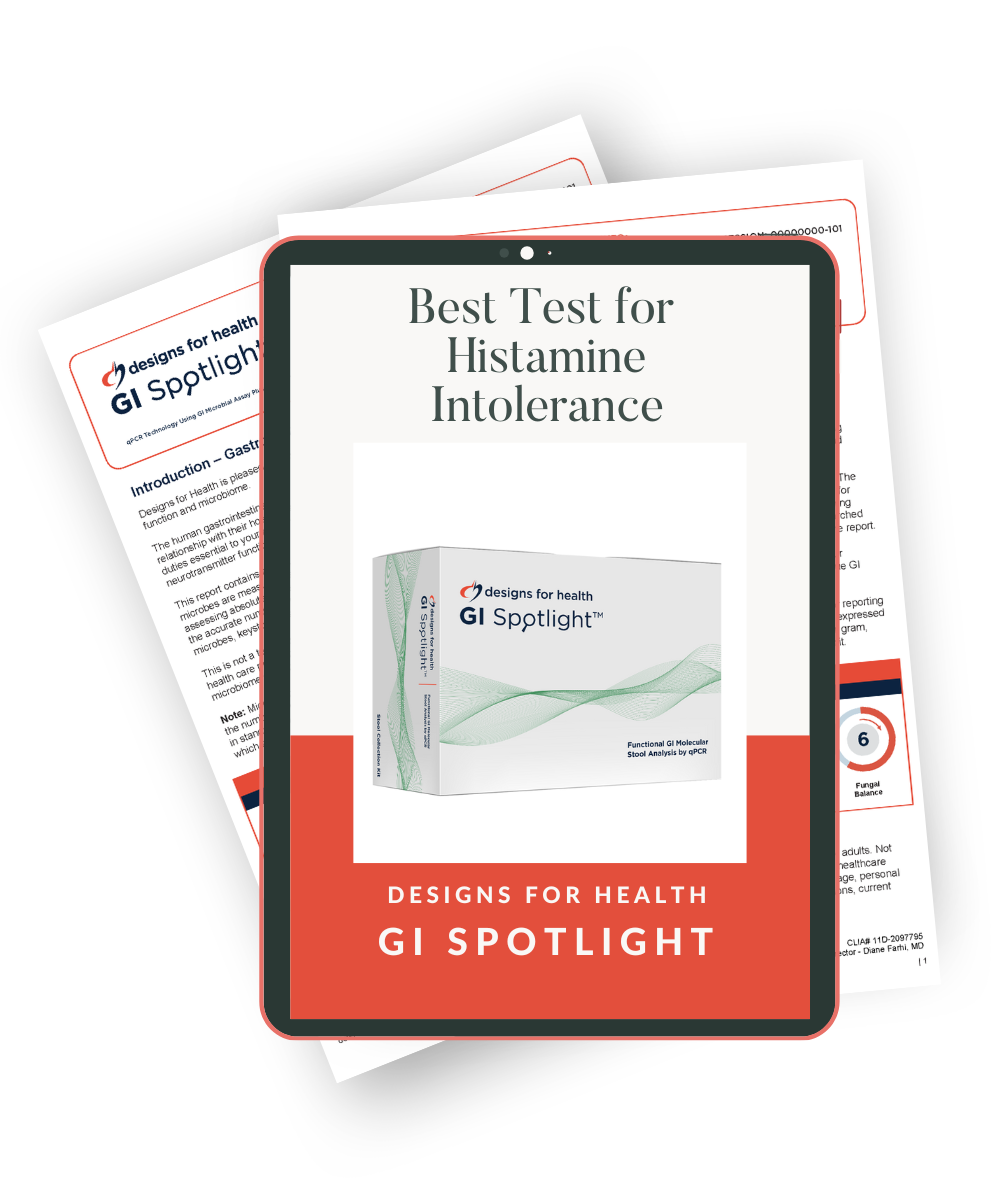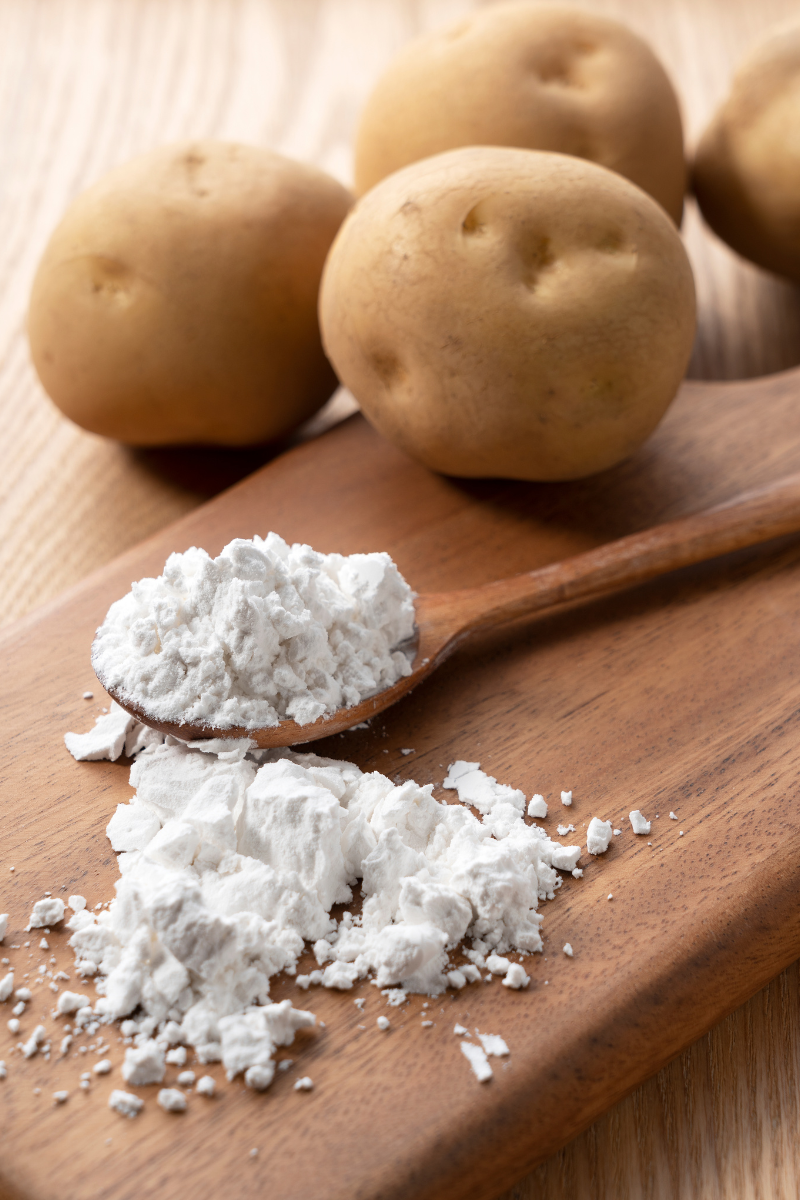Histamine Intolerance Originates in The Gut, so Probiotics Should be a Good Idea, Right?
If you’re dealing with
In your search for relief, you may have turned to probiotics. But did they help? Or did they make things worse?
Many people are unaware that while some probiotics support histamine balance and gut repair, others can actually increase histamine levels. In this blog, I will be exploring how probiotics interact with
The Root of Histamine Intolerance: It Starts in the Gut
Histamine is a naturally occurring compound that plays essential roles in digestion, immune responses, and communication within the nervous system.
While your body needs histamine to function properly, excessive amounts can cause problems. In a healthy gut, enzymes keep histamine levels in check by breaking it down efficiently.
Two key enzymes are responsible for this process: diamine oxidase (DAO), located in the gut lining, which handles histamine from food and gut bacteria, and histamine-N-methyltransferase (HNMT), which operates inside cells, particularly in the liver and nervous system.
When DAO levels are too low or become overwhelmed—due to genetic factors, chronic gut inflammation, or imbalances in the gut microbiome—histamine begins to accumulate in the body.
This buildup can lead to a wide range of symptoms, including digestive discomfort, skin reactions, anxiety, and sleep disturbances. Learn more about histamine intolerance.
Is Histamine Always Bad?
It’s essential to recognize that histamine plays a crucial role in gut and immune function. It helps with:
- Immune regulation – Histamine can be pro-inflammatory or anti-inflammatory, helping to support a balanced immune system.
- Gut motility – Stimulates the muscles in the intestines to help keep things moving.
- Healthy Digestion – Increases the production of stomach acid needed to break down food, especially protein.
- Blood flow – Boosts circulation by opening blood vessels for healthy digestion and movement.
In the right amounts, histamine is helpful. But when too much is produced—especially by histamine-secreting gut bacteria—it can lead to food allergies, IBS, IBD, leaky gut, and chronic inflammation.
Dysbiosis: The Hidden Driver of Histamine Overload
Gut dysbiosis refers to an imbalance between beneficial and harmful microbes in the digestive system.
Studies have found that individuals with
At the same time, they tend to have an overgrowth of histamine-producing bacteria like Proteus, Staphylococcus, Enterococcus faecalis, and Clostridium perfringens.
This microbial imbalance triggers inflammation, damages the gut lining—leading to what is often referred to as leaky gut—and reduces the production of DAO, the enzyme responsible for breaking down histamine.
Essentially, the gut becomes a histamine-producing machine without an effective way to manage the excess.
How Probiotics Can Help (Or Hurt)
Probiotics are living microorganisms that can benefit gut health if you choose the right ones. Here’s how the right strains can support histamine balance:
✅ Boost beneficial bacteria while suppressing harmful microbes
✅ Produce short-chain fatty acids (SCFA’s) like butyrate
✅ Helps reduce inflammation and histamine release
✅ Improves DAO activity
✅ Breaks down histamine and other biogenic amines
✅ Supports vitamin D metabolism – helping to balance our immune system
However, some probiotics produce histamine as part of their normal activity. For someone already overloaded, this can be like pouring fuel on the fire.
Strains That May Increase Histamine
Some bacterial and fungal infections—including Candida or yeast overgrowth, Clostridium perfringens (a common cause of food poisoning), Escherichia coli, Helicobacter pylori, and Staphylococcus (Staph)—can release histamine into the gut.
Additionally, certain probiotic or bacterial strains, although generally considered beneficial, may exacerbate symptoms in individuals with
- Lactobacillus gasseri*
- Streptococcus thermophilus*
- Bifidobacterium pseudocatenulatum
- Morganella morganii
- E. coli (which can either produce or degrade histamine, depending on the gut environment)
There are also probiotic strains that may either produce or break down histamine based on the surrounding gut environment and the histamine receptors that they target in the gut:
- Lactobacillus bulgaricus*
- Lactobacillus reuteri*
*These strains are commonly found in probiotic supplements and fermented foods such as yogurt.
Probiotics That Degrade Histamine and Support Healing
Some probiotic strains that are commonly found in probiotic supplements can break down histamine and reduce inflammation:
🔹 Lactobacillus plantarum
- Excellent at degrading histamine.
- Helps regulate tight junctions in the gut lining.
🔹 Lactobacillus reuteri
- Modulates immune responses via H2 histamine receptors.
- Supports gut barrier and serotonin metabolism.
- Has a dual role—can produce histamine under certain conditions, but also suppresses inflammation when acting on H2 receptors.
🔹 Bifidobacterium longum
- Decreases pro-inflammatory cytokines.
- Supports gut-brain balance.
🔹 Lactobacillus casei
- Reduces histamine and other biogenic amines like tyramine in food and the gut.
🔹 Saccharomyces boulardii
- Helps regulate the immune system.
- Improves the intestinal barrier, reducing leaky gut
- Increases SCFA (Butyrate)
What About Multi-Strain Probiotics?
Multi-strain probiotics may seem appealing, but for individuals with histamine sensitivity, they can be risky.
Many contain a mix of helpful and harmful strains—some degrade histamine, others create it. Plus, small amounts of each strain reduce the likelihood of persisting in the gut microbiota and establishing a population.
Instead, focus on single-strain supplements at higher, targeted doses. For example, a concentrated dose of L. plantarum may do more for your gut than a 12-strain blend with only small amounts of each.
Paraprobiotics: A Safer Option for Sensitive Guts
Paraprobiotics are heat-killed probiotic strains that don’t colonize the gut like live ones, but they can still support your health. Even though they’re not alive, they’ve been shown to reduce inflammation, support the immune system, and lower histamine levels.
Paraprobiotics also help balance your gut by working against harmful or histamine-producing bacteria, helping to balance out the gut microbiota.
Since they don’t actively grow or produce compounds in the gut, they’re less likely to trigger reactions. This makes them a great option for people with
In short, paraprobiotics can offer many of the same gut benefits, without the risk of histamine flare-ups.
My favorite paraprobiotics is Healthy Gut's Holoimmune, which contains three different heat-killed strains.
- Support year-round immune health, relieve skin immune reactions, improve gut immune health, and support oral gum health.
- Contains only 4 main ingredients- 3 different strains of heat-killed probiotics and Beta Glucans 1,3/1,6
- Heat Killed Probiotics are a breakthrough technology also known as Paraprobiotics. Researchers found these unique strains offered promising immune system benefits, including better function and balance.
Postbiotics: A Gut-Friendly Solution for Histamine and Inflammation
Postbiotics are health-supportive compounds produced by probiotic bacteria. One of the most important is butyrate, a short-chain fatty acid with powerful effects on gut and immune health. Here’s how butyrate helps:
- Repairs the gut lining and strengthens tight junctions, which helps reduce “leaky gut.”
- Lowers inflammation by calming immune cells and reducing pro-inflammatory messengers.
- Blocks histamine production from certain gut bacteria, making it helpful for
histamine intolerance .
Your body naturally makes butyrate when good gut bacteria ferment dietary fiber. Foods high in resistant starch, such as green bananas, cooked and cooled potatoes, legumes, and oats, are especially beneficial. Learn more about resistant starch and how you can increase SCFA's.
If you need more support, try Tributyrin-X, a supplement form of butyrate that’s better absorbed than sodium butyrate. Adding more fiber-rich foods and using targeted postbiotics can be a simple, effective way to lower histamine, reduce inflammation, and restore gut health.
- Tributyrin-X is the best postbiotic for restoring your gut health and getting back to the life you want, including normalized bowel movements, less bloating, protection against common food sensitivities, leaky gut healing, and helps to reduce histamine.
- Each capsule contains 99.9% pure liquid tributyrin-- The most bioavailable professional-grade butyrate-supporting supplement.
- Tributyrin-X is the ultimate postbiotic. Use it to improve sleep, increase energy, reduce bloating, and enhance microbiome diversity.
A Gut-Healing Strategy That Works
How to Balance Your Gut Microbiota and Reduce Histamine Naturally
To rebalance your microbiome and reduce histamine effectively:
- Follow a Mediterranean-style diet – Emphasize plants, legumes, whole grains, and healthy fats. Aim for 25–30 g fiber daily.
- Include cruciferous vegetables – Broccoli, cauliflower, cabbage, kale, and Brussels sprouts contain sulforaphane, which helps to balance the gut microbiota, reducing dysbiosis.
- Eat legumes – Beans, lentils, and chickpeas offer fiber and fuel for beneficial bacteria; introduce them gradually to prevent digestive issues.
- Avoid food additives – Emulsifiers, gums, antimicrobial agents, and artificial sweeteners can harm the gut lining and promote dysbiosis.
- Sleep well – Aim for 8 hours per night, as sleep deprivation negatively impacts gut diversity and increases the risk of dysbiosis.
- Manage stress – Chronic stress weakens gut-brain communication and digestion. Incorporate stress-relief techniques, such as breathwork or mindfulness.
- Use prebiotics – They are nondigestible food ingredients that promote the growth of beneficial probiotic strains, such as resistant starch and inulin (derived from chicory root). My favorite prebiotic is Designs for Health PaleoRS.
Should You Test Your Microbiome?
Discover What’s Really Going On in Your Gut
Microbiome testing gives you a detailed look at the bacteria and other microbes living in your gut. If you're experiencing issues such as bloating, food sensitivities, leaky gut, or
My GI Spotlight test is one of the most advanced and accurate stool tests available. It includes a comprehensive review of your results, along with a personalized plan that provides specific diet, lifestyle, and supplement recommendations to help repair your gut and reduce histamine levels.
The GI Spotlight test evaluates:
-
Overall microbial diversity and fungal balance
-
Histamine-producing and histamine-degrading microbes
-
Gut barrier health and intestinal permeability (leaky gut)
-
Digestive enzyme levels and nutrient absorption
-
Gluten intolerance markers
-
Inflammation and immune activity in the gut
With this insight, you can take targeted steps to heal your gut and feel better from the inside out.

GI Spotlight Microbiome Testing Package
Tired of guessing what’s causing the bloat, brain fog, or skin flares? Learn if
Final Thoughts
Probiotics can be powerful allies in healing
Whether you opt for well-studied, histamine-degrading strains, paraprobiotics, or postbiotic support, the key is personalization.
Healing from
Start with the fundamentals, choose your probiotic strategy wisely, and give your gut the support it truly needs to heal.
References
- Gubatan, J., Boye, T. L., Temby, M., Sojwal, R. S., Holman, D. R., Sinha, S. R., Rogalla, S. R., & Nielsen, O. H. (2022). Gut microbiome in inflammatory bowel disease: Role in pathogenesis, dietary modulation, and colitis-associated colon cancer. Microorganisms, 10(7), 1371. https://doi.org/10.3390/microorganisms10071371
- Kung, H. F., Lee, Y. C., Huang, Y. L., Huang, Y. R., Su, Y. C., & Tsai, Y. H. (2017). Degradation of histamine by Lactobacillus plantarum isolated from miso products. Journal of Food Protection. https://doi.org/10.4315/0362-028X.JFP-17-135
- Sánchez-Pérez, S., Comas-Basté, O., Duelo, A., Veciana-Nogués, M. T., Berlanga, M., Latorre-Moratalla, M. L., & Vidal-Carou, M. C. (2022). Intestinal dysbiosis in patients with
histamine intolerance . Nutrients, 14(9), 1774. https://doi.org/10.3390/nu14091774 - Schnedl, W. J., & Enko, D. (2021).
Histamine intolerance originates in the gut. Nutrients, 13(4), 1262. https://doi.org/10.3390/nu13041262 - Singh, V., Lee, G., Son, H., Koh, H., Kim, E. S., Unno, T., & Shin, J. H. (2023). Butyrate producers, “The Sentinel of Gut”: Their intestinal significance with and beyond butyrate, and prospective use as microbial therapeutics. Frontiers in Microbiology, 13, 1103836. https://doi.org/10.3389/fmicb.2022.1103836
- Smolinska, S., Winiarska, E., Globinska, A., & Jutel, M. (2022). Histamine: A mediator of intestinal disorders—A review. Metabolites, 12(10), 895. https://doi.org/10.3390/metabo12100895
- Vallejos, O. P., Bueno, S. M., & Kalergis, A. M. (2024). Probiotics in inflammatory bowel disease: Microbial modulation and therapeutic prospects. Trends in Molecular Medicine. https://doi.org/10.1016/j.molmed.2024.12.005
- Yu, Z., Chen, J., Liu, Y., Meng, Q., Liu, H., Yao, Q., Song, W., Ren, X., & Chen, X. (2023). The role of potential probiotic strains Lactobacillus reuteri in various intestinal diseases: New roles for an old player. Frontiers in Microbiology, 14, 1095555. https://doi.org/10.3389/fmicb.2023.1095555
- Siciliano, R. A., Reale, A., Mazzeo, M. F., Morandi, S., Silvetti, T., & Brasca, M. (2021). Paraprobiotics: A new perspective for functional foods and nutraceuticals. Nutrients, 13(4), 1225. https://doi.org/10.3390/nu13041225








